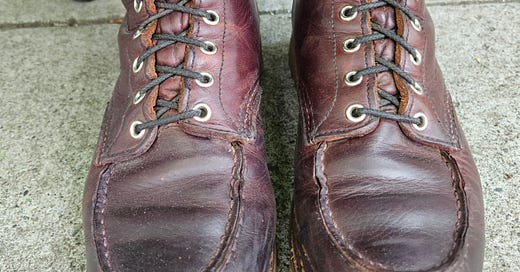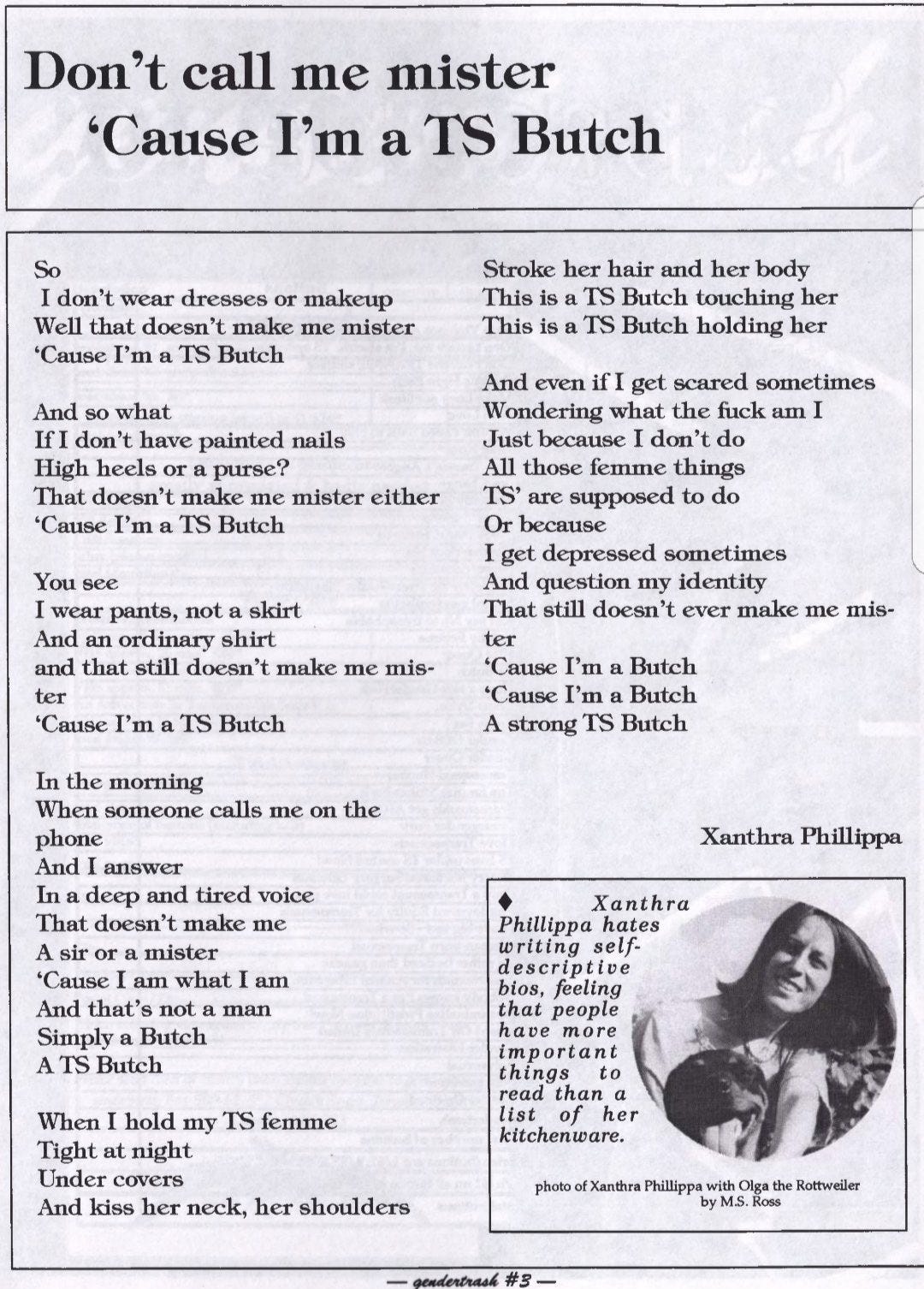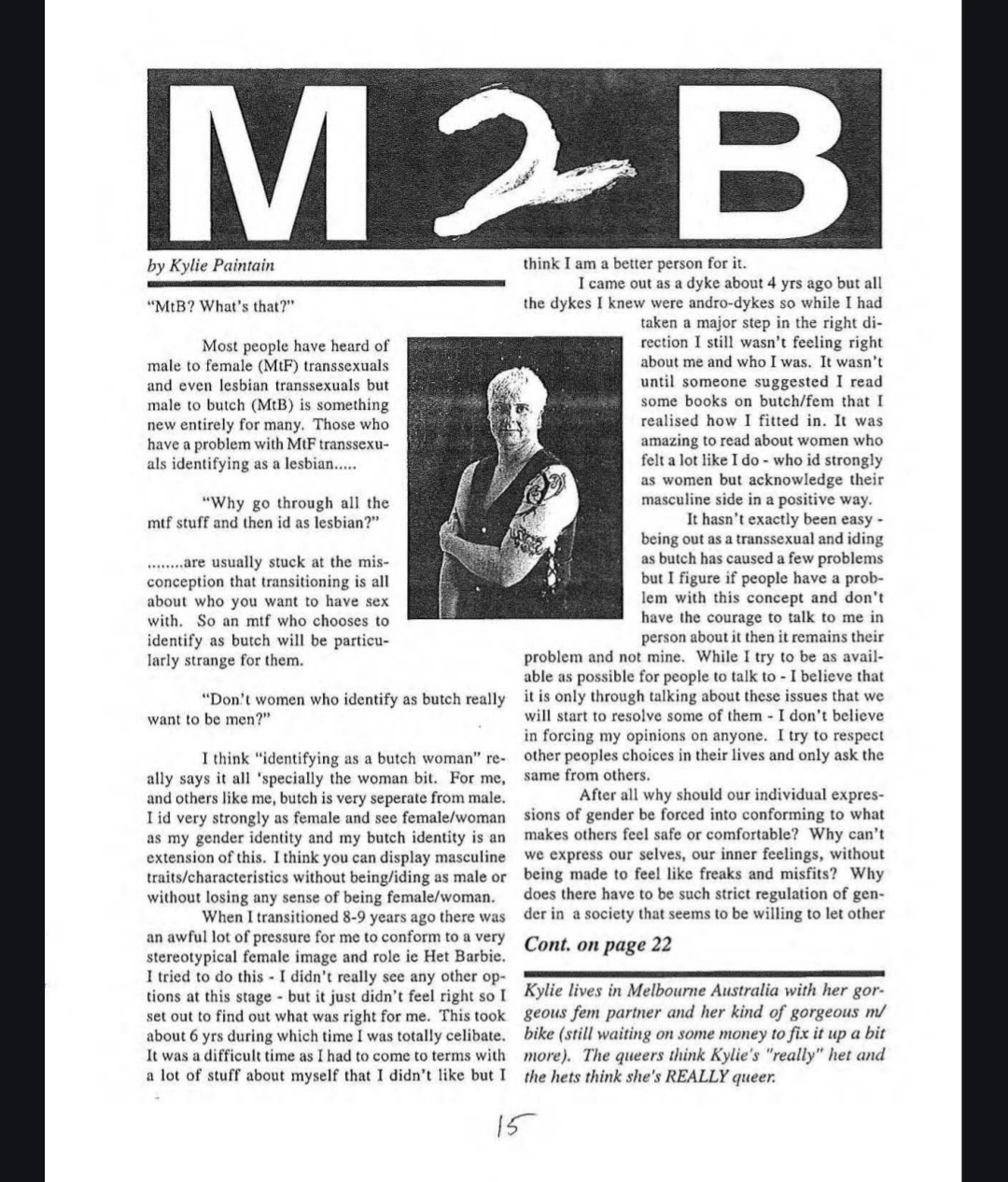This is a hard piece to start. Butchness and trans womanhood are not classically thought of as complimentary or even related, and still they are the two gendered forces that have most animated my adult life. I am both a butch trans woman and have borne witness to the explosion of butch trans womanhood onto the scene over the last ten years or so. This is a deeply personal thing for me and also something that younger trans women (both in actual age and in trans years) ask me about in terms of history or theory. So here is my attempt to put down what I know, things that I’ve witnessed and things I’ve found by digging through our herstory.
Some personal notes first. I first came out as a trans woman 12 years ago this month, right after my 18th birthday, and after spending most of my teens as the local faggot bicycle. I’m 30 now, so nothing like an elder but old enough to have seen a few things. I stepped in and out of the nonbinary closet a lot those first two years, as lots of trans women do. In fits and starts I tried to inhabit the kind of punk femininity that I so looked up to and desired. Ultimately it never felt right, though it did sometimes feel good, and by the time I was 20 I was starting to explore the kind of butch presentation that would eventually come to define my womanhood.
I didn’t know that trans women were allowed to be butch though. All the butches I knew were young transmisogyny-exempt nonbinary people, sometimes trans men. I knew that butch cis women existed, though I had only met a couple in passing. All the trans women in my life then were like me: young, pre-transition, and varying shades of feminine. That changed for me sometime in early 2015.
On Tumblr one day I came across a trans woman I didn’t know, a girl a couple years older than me from Minneapolis. We’ll call her Jane. Jane had started transitioning a year or two prior, something I was in the process of figuring out. Like me she was muscular and tattooed, her hair short. I don’t remember what precisely the text under her selfie read but I do remember one crucial thing: she called herself butch.
That was huge, my proverbial “ring of keys” moment. I messaged her right away and we kicked off a friendship that continues today. I didn’t tell her this until much later but seeing her on the hell site that day gave me the courage to claim a butch identity for myself and changed the course of my life. Though I’d lived a life outside of hetero-world since I was 12 my queer life as I know it started right there. I started hormones soon after that, and was quickly swept up in a brilliant, stumbling, confused, in turns utopian and deeply pessimistic movement of trans women grabbing butchness and making it our own.
Online in those days there was a growing number of butch trans girls floating around, mostly finding each other on Tumblr and Twitter. Many were white, though not all. Some had been Baeddels (a controversial radical transfeminist movement online that deserves its own piece) a couple of years prior, others had experience on the pre-Bernie socialist left, and still others came from anarchist backgrounds. All were interested in lesbian herstory and subculture, specifically butch-femme and the writings of Leslie Feinberg. Stone Butch Blues was required reading, as were Boots of Leather Slippers of Gold, Odd Girls and Twilight Lovers, and The Persistent Desire. These books, some of which were out of print, were hunted down and eventually compiled into a now-popular google document.
Understand that butch-femme was experiencing a revival amongst all sorts of dykes at the time, not just trans women, so there was a larger river for our little stream to feed into. The transmisogyny-exempt revivalists didn’t always like trans women but nevertheless we were there, butch and femme alike, asserting our dykeness and our right to express our genders in whatever ways we saw fit. We did this with a bizarre combination of radical feminist theory (Wittig was very popular) and butch-femme nostalgia. Let’s dig into the motivations behind this for a minute.
If you asked any given butch trans dyke in the scene in the period between 2015 and 2019 just exactly why we were butches you might get a myriad of answers but one common theme would be what we called compulsory femininity. In the days before and then immediately after the so-called trans tipping point younger trans women felt like we had a little more room to experiment. WPATH standards were beginning to relax in many states and so it didn’t feel, for a lot of us, like our transitions were at risk if we didn’t perform femininity to a T.
So we refused to perform. Taking hints from radical feminists (though obviously not their criticisms of butch-femme) and their refusals of femininity, we rejected the socially imposed femininity that, in our view, suffocated trans women. We knew the history of WPATH, how medical transition was withheld from trans women who didn’t adequately perform arbitrary and regressive standards of womanhood. Many of us saw it as our feminist duty to refuse those standards and claiming a butch identity seemed the clearest and most obvious way to do so.
Our little revival scene also spent a lot of time digging through various LGBTQ archives, zine collections, books, anything we could find in order to try and find ourselves in dyke herstory. Many of us had been gay boys, or at least incubated our queerness amongst them, and we knew that was true of many trans women through history. That history was readily available online. The more hidden history, from our perspective, was of trans women in lesbian spaces and organizations. We learned about Nancy Burkholder and Michfest, Janice Raymond’s vendetta against Sandy Stone and Olivia Records, and Robin Morgan’s vicious denunciation of Beth Eliot at the West Coast Lesbian Conference in 1973. We had been there, it seemed, but things had gone poorly for us, and these were androgynous 70’s lesbian feminists (with perhaps Nancy Burkholder, self described leatherdyke, as the exception), not butch-femme bar dykes.
I don’t remember where I first saw Xanthra Phillippa’s poem Don’t Call Me Mister ‘Cause I’m a TS Butch. Originally published in the third issue of the zine Gendertrash From Hell in 1995, it is the earliest piece I can find wherein a trans woman self consciously identifies herself as butch. I read it constantly, and every butch t-girl I knew shared it around on a weekly basis. This was proof that we existed, that even though we were breaking some big gender rules that we weren’t the first ones to do so. Still to this day when a baby butch trans dyke asks me how girls of my generation got through it, I send her Don’t Call Me Mister.
A more in-depth, but still short, 1997 article from the zine Unapologetic: the Journal of Irresponsible Gender serves as the first instance that I can find of a butch trans dyke articulating why she feels butch. Author Kylie Paintain explains, “I think ‘identifying as a butch woman’ says it all, ‘specially the woman bit. For me, and others like me, butch is very separate from male.”
Everything in Paintain’s article resonated strongly with us, even 20 some years later. She describes feeling pressured into conforming to what she calls a “Het Barbie” standard, wanting to refuse that standard, and eventually finding butch-femme expression through books suggested by a dyke friend of hers. Many of our stories were the same. She touches on something else, too: refusing femininity was not, in it of itself, enough for her to be butch.
I’m about to make an uncomfortable distinction, but please bear with me. After 2018 a lot of my butch sisters started going femme again, and staying that way. This was controversial at the time, which is embarrassing now, but we struggled to understand or explain it. Were our sisters giving up, capitulating to compulsory femininity? With the benefit of hindsight we can see what happened. See there is a subtle but important difference between butches by default, meaning trans girls who rejected or were uncomfortable with normative femininity and landed on butch as the obvious alternative, and self conscious butches, meaning trans girls who were consciously expressing butchness not as a way to avoid femininity but as one form of trans womanhood.
The former category are typically called boymoders now. They are usually girls who feel like they can’t access the kind of femininity they really want and so preemptively reject it, sometimes even to the point of hostility towards more feminine trans women. The butches-by-default that I knew all went femme later on. By rejecting hetero-femininity and engaging intentionally with a lesbian subculture that not only allowed them to experiment with butchness but also celebrated dyke femininity they developed a femininity that felt like theirs instead of like something imposed by a psychologist. They became femmes instead of simply feminine.
Those of us who stayed butch moved on from simple refusal. We found in butchness a way to confidently move through the world, to embrace our lives as lesbians, as dykes, and to express our womanhood. It might seem odd to outsiders but there is a decided difference between dressing like a man and dressing like a butch, even in the same clothing. Growing into butchness is the process of learning that difference and self consciously placing yourself on one side of it.
It doesn’t make you any easier to understand for straight world, but fuck ‘em. The community usually gets it, and that’s what really matters. Straight men tend to react to us as if we were any other butch, somewhere on the spectrum from apathetic to hostile. Mainstream trans culture starts to lose its sheen too, with neither popular representations of trans women nor trans men looking particularly relatable. That’s not specific to trans women though, lots of butch cis women felt that way in the past and still managed to find solidarity with other women, so we surely can too. No matter how butch you are, remember, transmisogyny is still a useful weapon against you. Doesn’t matter if it’s picked up by heterosexuals or your local theyfab, if you’re a trans woman those sights are trained on you. Act accordingly.
It really is surreal to “pass” as a woman (how can you pass as what you are?) with a shaved head and heavy work boots, but I’m here to tell every baby trans girl who doesn’t want to give up her leather and jeans that there is a way forward. It’s not easy, but no transitioning is, and if you don’t like it you can always change things up down the line. Regardless of what we said as young die-hards, there actually isn’t any shame in exploring your feminine side and finding a home there.
My micro-generation of butch trans girls started to go their separate ways around 2019. We were all hitting our mid-late 20’s and the appeal of arguing over the nuances of 50 year old lesbian discourse was waning. A new generation of young dykes was coming up and they seemed, to us, insistent on rehashing all the fights we ourselves had rehashed years prior. So we moved on. We got involved in all kinds of organizing, from putting together leatherdyke community to communist party building to Black nationalist organizing to furthering transfeminist analysis. Many of us are still friends, some of us are still enemies. Some of us are huge on social media, some disappeared from the internet entirely. Most of us are still kicking, a tragic few have since died.
Regardless, we all shared those few years where we felt like the first sisters in a long time to try and break out of the old standards, to do something old in a new way, making mistakes and fucking up and learning new lessons. Were we as revolutionary as we felt? Certainly not, but we definitely put our weight together and wedged the gender door open a little wider for the baby butches to come.





